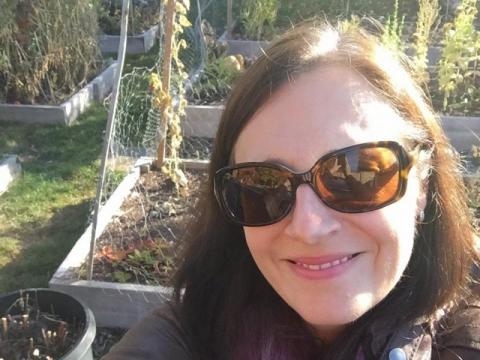Member journalism: Reflections On An Evening With Tarana Burke

Many thanks to Nadia Sokal (pictured at left), a member of the PSAC Okanagan Regional Women’s Committee, for this report from an interesting and important event held in Kelowna recently.
Reflections On An Evening With Tarana Burke - A UBC Connects Speaker Series event at the Kelowna Community Theatre on March 6th, 2019
Tarana Burke is a phenomenal woman. I first heard about Ms. Burke during the #metoo movement in 2017, when the movement was popularized during the highly publicized reports of workplace sexual harassment in Hollywood. I'll admit I was very excited, yet a little hesitant about attending this event, an hour from home on a very snowy Wednesday night. I consider myself a relatively “new” social activist. I have always supported social advocacy but in the past few years I have stepped up my game with involvement in my community as well as PSAC councils and committees.
Like many social activists, I'm passionate. This passion is not always good for my mental health. I was hesitant about attending the event primarily because I knew it would affect me for days, weeks...and frankly, I didn't feel like I had the emotional energy. Ms. Burke had such a charismatic presence and delivered important messages of empowerment by empathy, talking to young children about pain, and protecting marginalized members of our community. She spoke with passion, poise, a dash of humour and an energy that invigorated, rather than depleted.
What I learned & how I was impacted
Ms. Burke opened with her story about a girl named “Heaven”, and how the origins of the phrase “metoo” began. The story is posted on the metoo website here.
Ms. Burke’s talk was inspiring and moving. The two messages that stood out for me involved children and marginalized people in our communities.
Ms. Burke spoke about the lack of language there is to describe sexual abuse and its pain, especially in the limited vocabulary of children. She proceeded to talk about how children understand cause and effect. When a parent or caregiver says “I’ll kill anyone who touches you” or something of that nature, the child connects that their caregiver will go to jail because killers go to jail. As a community, we need to be very thoughtful about how we speak to children about this topic, to ensure they have the language, as well as the confidence to disclose issues to a trusted adult.
The other message that stuck with me was that our communities are only as safe as the most marginalized members. Ms. Burke began to read out statistics on sexual violence in British Columbia and noted that statistics skyrocketed when you started to look at the numbers in relation to Indigenous women. If the most marginalized members of a community are treated poorly, that treatment is a reflection of the community around them. To me, this is such a simple idea that I had never heard before. This idea stayed with me for weeks and is relevant to so many community issues. For example, now, when I speak to members who don’t understand why bargaining for paid leave for domestic violence is important, I’ll bring up this message. If our community, our union and our members aren’t supporting the most marginalized individuals, that’s a reflection of the community, not the individual.
It was very obvious that few men were in the crowd. This is a community issue and all members of the community are part of the solution. I asked some of my male friends, the week after the event, that if they were invited to an event like this, would they go? Most of the responses were positive but they voiced concern on how they would be perceived? Were they welcome and is it really their place to be there? The men I questioned are not vocal activists, but their actions have shown me that they support women’s issues. Some may argue that it’s not the purpose of this movement to make men comfortable.
However, we need everyone’s participation, as we are all essential in the larger picture of combatting sexual violence. Ms. Burke also spoke about the need to be critical of how the media has twisted the purpose of #metoo. She stressed that this isn’t a movement to destroy men, but a global community of survivors taking action against sexual violence and community healing. I feel very privileged to have been able to attend this talk, and thank the PSAC Okanagan Regional Women’s Committee for funding my ticket. For those who wish to see Ms. Burke’s presentation, a video and audio recording will be available in the coming weeks at events.ubc.ca.
I’ve lived in the interior of British Columbia for over ten years, after moving from Toronto, Ontario, where I grew up. One of the very few things I miss is opportunities to attend events and see speakers like Tarana Burke. Maybe living in the interior has more opportunities than I thought, especially on snowy Wednesday evenings.
